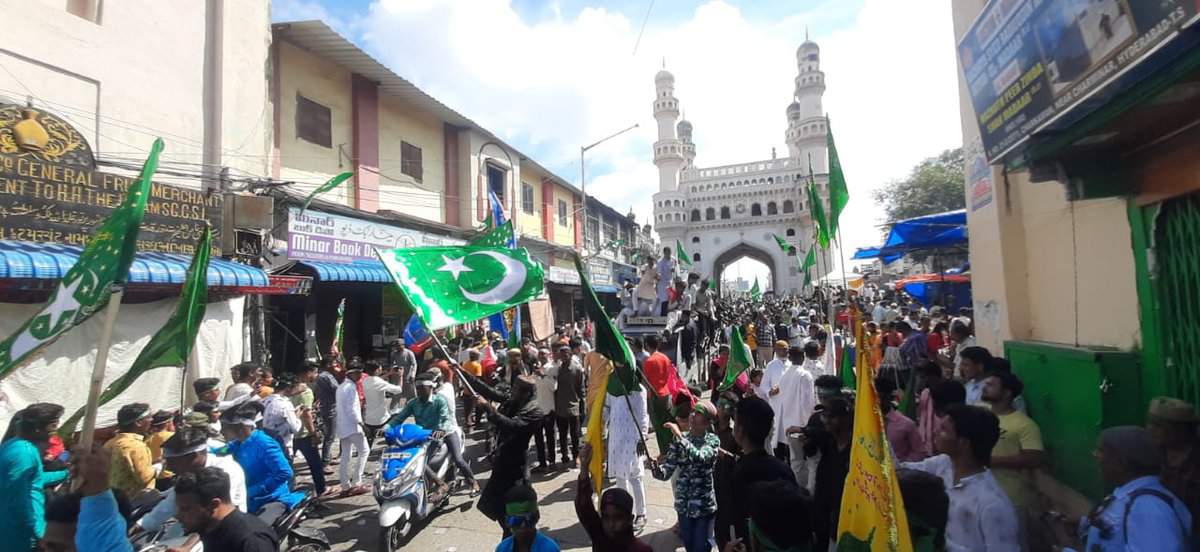
The Milad-un-Nabi juloos (procession) scheduled for September 28 in Hyderabad found itself hinged on the indecision of its organisers, primarily due to their conflicting stances.
This inability to present a unified front gave the impression that they would remain divided. The organizers oscillated between announcing postponements, cancellations, and finally a commitment to reschedule the event at an undisclosed date and time. What remains unmistakably clear amidst this confusion is that internal discord has plagued the organisers.
For the past 16 years, the Milad juloos has been orchestrated by SUFI (Sunni United Forum of India), representing the prevailing strain of Islam in Hyderabad. SUFI serves as an overarching entity, encompassing several small and large organizations and orders, including Markazi Anjuman-e-Quadria, the Seeratun Nabi Academy, Khwankhwah-e-Shuttaria, Quadri Chaman, and Quadria International, to name a few.
A surprising turn of events occurred when the Quadri Chaman representatives declared the suspension of the juloos. Their rationale was the simultaneous occurrence of the Ganesh immersion procession and the Milad-un-Nabi juloos on September 28. Although not explicitly stated, this decision was likely driven by concerns over potential breach of law and order in the city. Critics argue that this move was made without thorough consultations with other relevant organizations, leading to widespread confusion.
Notably, Maulana Ali Quadri from the Seerat-un-Nabi Academy, a member of the delegation of Muslim faith leaders who visited Kashmir in 2019 after the abrogation of Article 370, voiced his objections. He argued that those announcing the suspension failed to engage with other stakeholders and an initiation of discussions with the top police authorities regarding the juloos to put forward the importance of the event was needed. Maulana Ali’s objections were widely shared on social media platforms. A few days later, however, he reversed his stance, declaring that the Milad procession was not postponed but canceled due to concerns about potential communal disturbances and the subsequent breakdown of law and order. The reasons for Maulana Ali’s sudden change of heart remain unclear.
While the Muslim community, especially the youth, grappled with these developments, murmurs of dissent and discontent began to surface among SUFI organizations. Under the banner of the Markazi Milad Juloos Committee, figures such as Maulana Sayeed Quadri from Quadria International, Syed Nadeem Hussaini from Dargah Hazrat Shah Raju Qattal, Shujauddin Iftequari from Khankha-e-Haqqania Anwaria, and Mufti Anwar Ahmed, among others, convened at Khankhwah-e-Shuttaria. During this meeting, Kamil Pasha was elected as President, and Khader Mohiuddin Quadri assumed the role of Secretary. They refuted Maulana Quadri’s stance and announced their intentions to proceed with the Milad juloos, albeit on a different date than September 28.
Social media platforms buzzed with comments and questions from people pondering why these groups were unable to reach a consensus.
It is plausible that the city police, mindful of potential disturbances, played a role in advocating for the postponement, suspension, or cancellation of the Milad juloos. Sources suggest that both the State government and the police are exercising caution, aiming to prevent any semblance of communal unrest. The South Zone police have actively engaged with stakeholders, peace committees, and the public, seeking to raise awareness about the situation and the potential consequences of a breakdown in law and order. The police have intensified patrols, engaged with individuals with a history of disruptive behavior, conducted Mission Chabutra operations, and increased surveillance to instill confidence among the public and deter potential troublemakers.
Some sources argue that canceling the procession could have established an undesirable precedent for the Milad juloos, and therefore, postponement may be the more prudent course of action.
